Roger’s Stage 2 Pancreatic Cancer Story
Interviewed by: Alexis Moberger
Edited by: Chris Sanchez

Roger, a lawyer into startups and the venture capital scene and a sports enthusiast, hails from Silicon Valley in Palo Alto, California. He discovered that he had pancreatic cancer in 2022.
Roger enjoys a very active lifestyle and strives to live a healthy life, but suddenly suspected he had cancer after his blood sugar increased and he started to lose weight. A liquid biopsy–a Galleri blood test by the healthcare firm GRAIL–revealed strong signals for certain types of cancer, including pancreatic cancer. An MRI from the company Prenuvo found a mass on his pancreas, and a CT scan and tissue biopsy confirmed that he had stage 2 pancreatic cancer.
Pancreatic cancer is often seen as incurable and fatal, but Roger refused to accept this. His take-charge attitude to his health led him to conduct extensive research into his illness. Being based in Silicon Valley also gave him access to excellent medical care, but his openness to cutting-edge medical treatments–as well as the urgency of his case–brought him further afield, including to Japan, where he got the first dose of an advanced cancer vaccine.
Roger also made certain significant changes to his lifestyle, with an eye towards not only staying healthy, but also making his body as inhospitable to cancer cells as possible.
Roger is no longer on chemotherapy and undergoes follow-up protocols every 6 months. He shares his story to encourage cancer patients to be more assertive regarding their illnesses and overall health, to do their own research and seek out the best treatments available, to refuse to settle for “standard of care” treatment, and, lastly, to never give up hope.
- Name: Roger R.
- Diagnosis:
- Pancreatic cancer
- Staging:
- Stage 2
- Symptoms:
- None
- Treatments:
- 5FU (folfirinox)
- Gemzar (gemcitabine)
- NK cell expansion therapy
- Dendritic cell expansion therapy
- Neoantigen peptide vaccine
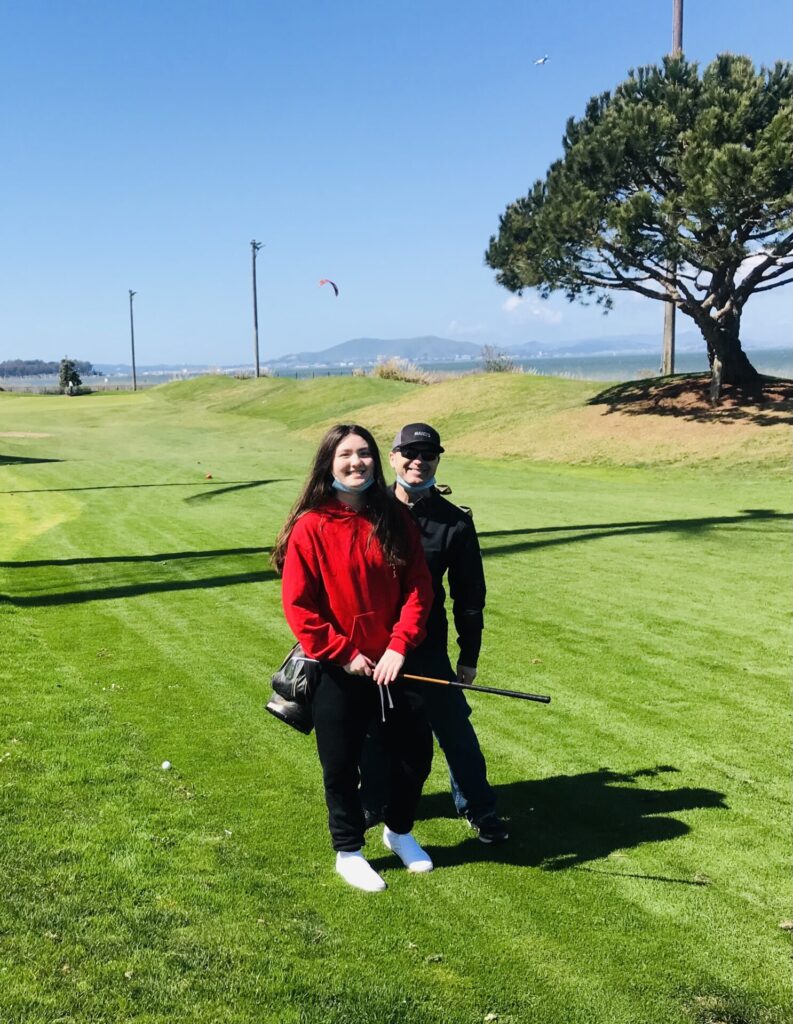
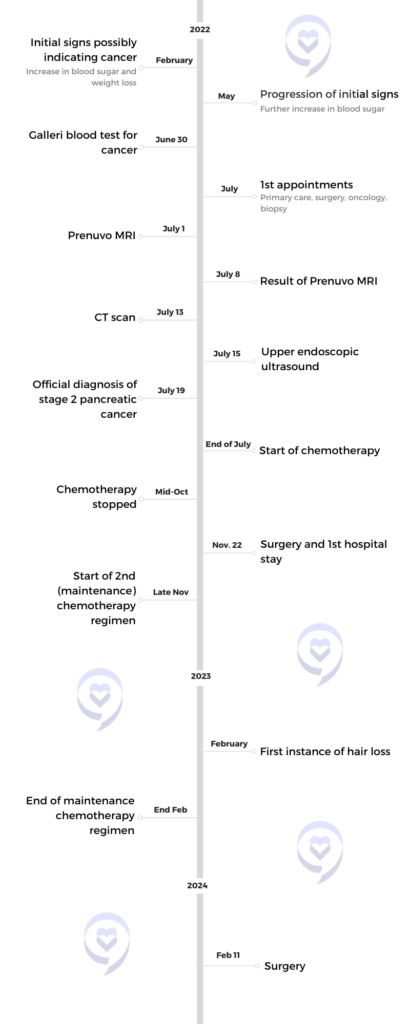
This interview has been edited for clarity and length. This is not medical advice. Please consult with your healthcare provider to make informed treatment decisions.
The views and opinions expressed in this interview do not necessarily reflect those of The Patient Story.
Your health care, your health is just too important to trust to a doctor, as odd as that sounds… It is my personal experience that you have to take charge yourself.
You have to tell your doctor what tests you want run. You have to tell your doctor what you’re concerned about. You know your body better than anybody does.
And if you think just even subconsciously, that there’s something going on that shouldn’t be, you need to tell them.
Introduction
I’m a lawyer and I do startups and venture capital in Silicon Valley, California, in the Palo Alto area.
In terms of hobbies, I work out a lot. I swim, bike, run, hike, do resistance training, winter mountaineering and ice climbing, rock climbing in the spring and summer–pretty much every sport and every activity you might imagine. I stay very active.
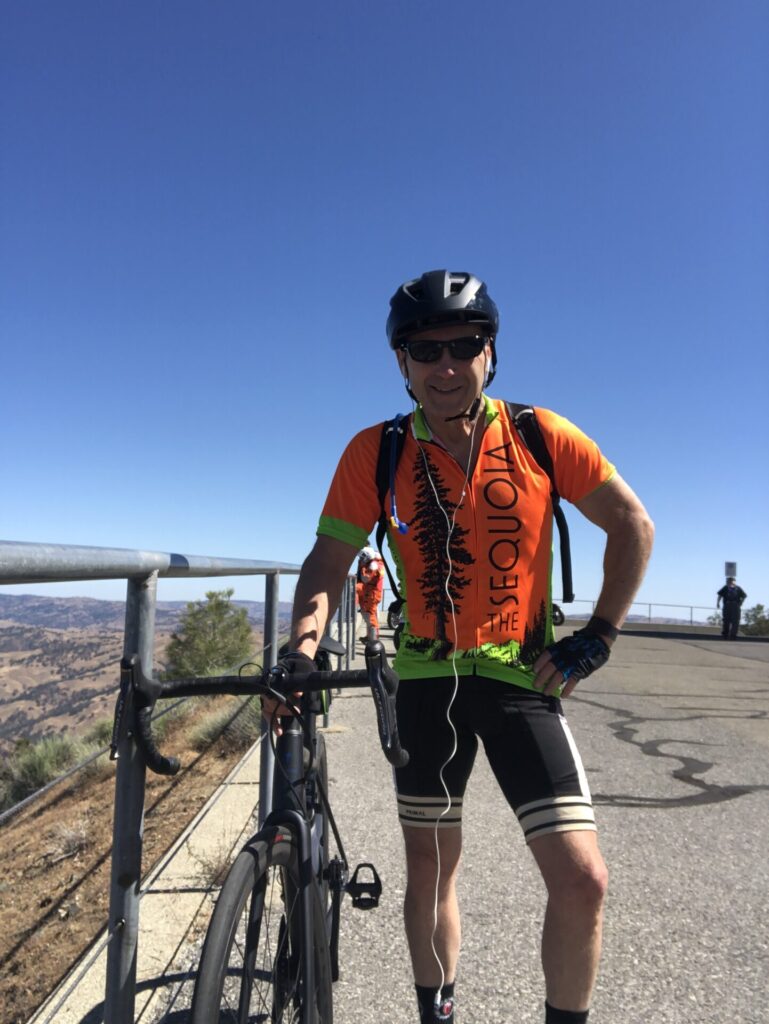
Pre-Diagnosis
Signs and not Symptoms
At the time, before I was diagnosed, I didn’t think anything was wrong. But looking back on it, let’s say I had no symptoms, but I did have signs. There were clues. And the one big one that I and my doctors completely missed was that my blood sugar increased just slightly. You see, my blood sugar has always been exactly where I want it to be.
And so I went in and I got blood tests. The doctor said, well, that just happens. You know, fasting glucose is kind of all over the place. Your a-1c is fine. It probably doesn’t mean anything. And I said, well, it must mean something. It’s higher than it was before. She said, well, we’ll come back in three months and test it again.
So I came back in three months and it had gone up even more. Not only that, I’d also lost 5 pounds in the meantime. And I Googled it, of course. And that was my first clue, because there’s like a million things that could cause that to happen, one of which is pancreatic cancer.
I know now that that always happens with pancreatic cancer, weight loss and blood sugar increase. I didn’t know it then.
Diagnosis
Galleri Blood Test by GRAIL
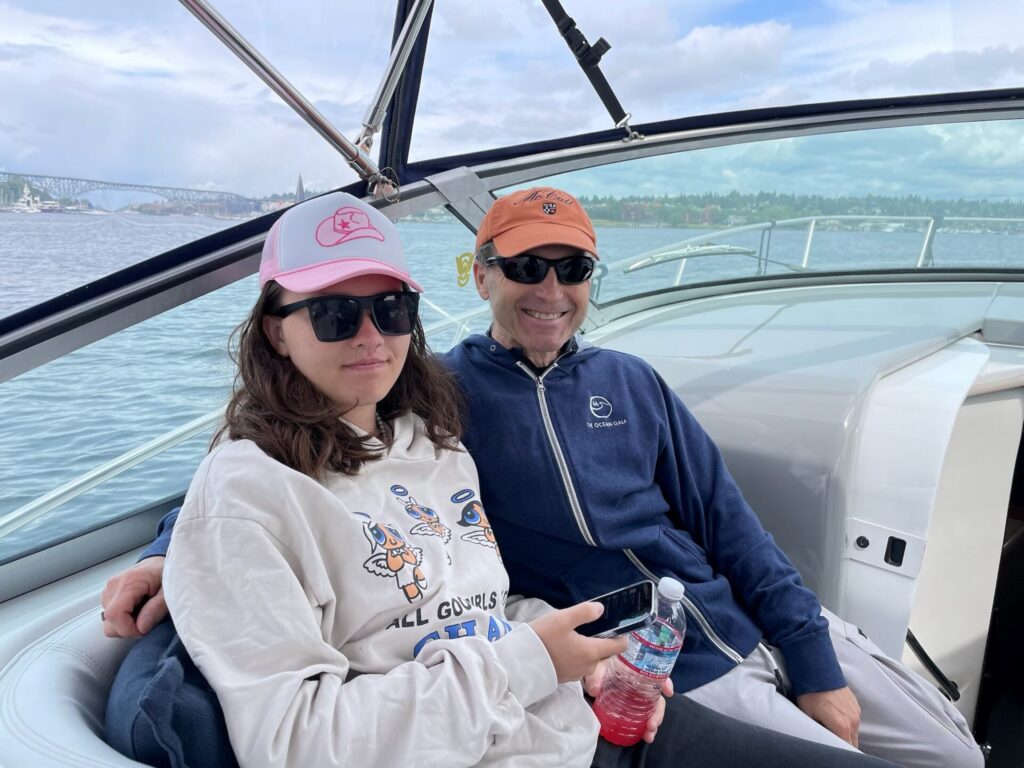
I went and got a battery of other tests, one of which was a liquid biopsy that first disclosed my cancer. So I used a blood test by Galleri by GRAIL. We call it liquid biopsy. This is a blood test that can detect 50 different cancers. They take blood, not tissue, and they can examine it and look for protein markers using strong AI to assist it, that will identify markers of different types of cancers and the tissue of origin.
Here’s the story of how I ended up getting a Galleri test.
Because I’m in Silicon Valley, I’m at the cutting edge of every new technology that comes out. And I’d heard about these tests being developed, and I’d been asking for them year after year. But the response was always the same: no such thing, it doesn’t work, it’s not available yet, you can’t have it, the FDA hasn’t approved it. Well, I was sitting in an airplane in April of 2022, reading a Tony Robbins book, and it mentions the Galleri test. And as soon as I landed, I started investigating.
Now, it took me a couple of months to actually get that test because a doctor has to prescribe it. That is just the rule in the U.S. I pushed ahead and found a telemedicine doctor that would prescribe a test.
I found an institution that advertised that they were all about preventative care. They’re all over the TV, a lot of advertising promoting that. What I liked about them is at least they didn’t say no, but I still had to tell them what I wanted. So like I told them long before this happened, I gave them a list of blood tests that I wanted, including the Galleri test.
It took about a couple of weeks before I got the results from the test. The doctor called me up and said, look, we found some signals for pancreatic or gallbladder or stomach or esophagus. And you should do further testing. It doesn’t mean you’ve got cancer. It just means we found strong signals, especially for pancreatic cancer.
And based on that, I went in for an MRI the very next day.
Prenuvo MRI
Well, again, you can go into your hospital and you can wait around until they come back from vacation and get around to scheduling you. Hopefully they’ve got the personnel to do it, and so on.
I didn’t do that. I went the very next day and got a private scan from a company named Prenuvo, which is right down the street from my house.
The results from the MRI took about a week to come back. It found a mass on my pancreas–a pretty imposing, concerning-looking mass. It was not well defined; it was large. In fact, they didn’t even think it was resectable.
So the Galleri test was alarming because they found the signal, the Prenuvo test was more alarming because it confirmed there was something going on in my pancreas that did not look good.
CT scan and tissue biopsy
Based on the MRI’s findings, I went to a CT scan and a tissue biopsy where they actually examine tissue. I had to get into the system because then I needed more sophisticated things. CT with contrast, biopsies, endoscopes, stuff like that.
And the CT scan and biopsy confirmed a diagnosis of stage two pancreatic cancer.
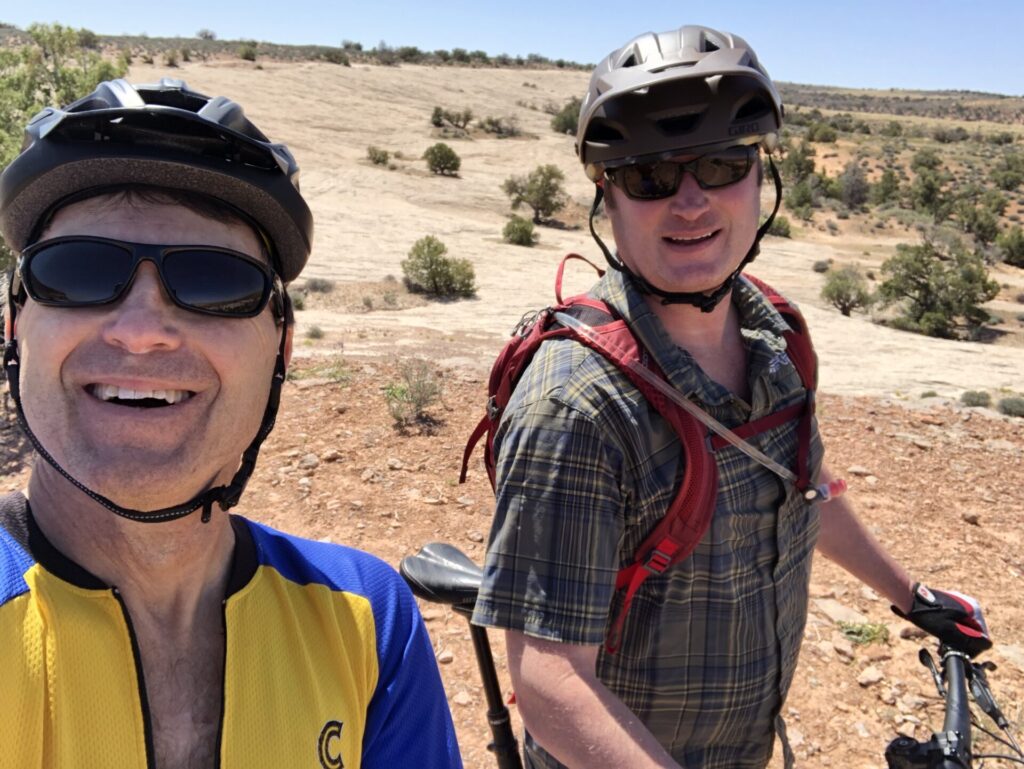
Primary care doctors’ attitudes
Now, prior to this point, what I heard from my primary care doctors was mostly: quit bugging me about this. It’s not serious. You’re not diabetic. You’re not pre-diabetic. You have no symptoms. And I’ll never forget these words. That is unnecessary testing. Boy, it was not unnecessary at all.
I guess I’ll admit, maybe I’m a little of a hypochondriac, but I want to check out every little thing. It’s just my personality.
This is the one big message I would like people to have.
Your health care, your health is just too important to trust to a doctor, as odd as that sounds. And as much as it pains me to say that, it is my personal experience that health is too important to trust to a doctor, you have to take charge yourself. You have to tell your doctor what tests you want run, and what you’re concerned about. You know your body better than anybody does. And if you think just even subconsciously, that there’s something going on that shouldn’t be, you need to tell them.
Reaction to the Diagnosis
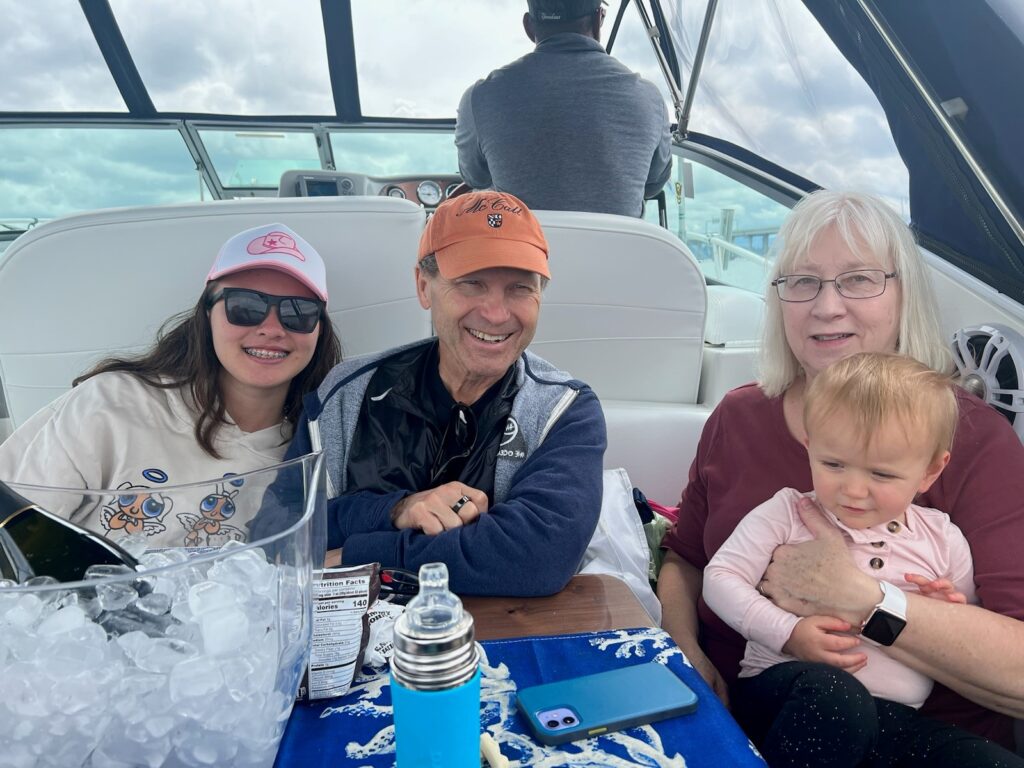
I went through all of the stages of grief in about 12 hours, I think. Bargaining, anger, whatever they are. Sadness, acceptance.
The conventional wisdom about pancreatic cancer, what American Cancer Society says, is that it’s incurable and fatal. Stage two has a life expectancy of about 1 to 3 years on average.
Like a lot of cancer patients, I was angry at my doctors. It’s like, how could you let this happen to me? Until I finally came to the realization that, hey, it’s not their job to keep me healthy. That’s my job. This is my failure, not theirs.
Their job is to fix me when I’m sick, and that’s why I kept hearing from them. Come back when you’ve got symptoms. So, big lesson, find a doctor that’s willing to work with you and prescribe what you need to take care of your concerns. But then go out and self-educate and make sure you’re covering all the stuff that is silent or symptom free.
Another thing is that, yes, the statistics regarding pancreatic cancer are really bad–and even many prominent doctors will say things like, pancreatic cancer is a death sentence at any stage–but what I came to discover is that all of those doctors are looking at backward-looking data. Plus, that data is kind of old because you’ve got to wait a certain number of years to get it.
The statistics are based on the United States standard of care, on what we’ve done in the past under it. They are not based on what’s going on, going forward, and what’s out there in the future and what’s beyond standard of care.
And, also, statistics are very misleading because you have to make generalizations.
I talked to a lot of cancer patients and survivors, and one of the pancreatic cancer survivors I talked to–one of the few who’s survived for 12 years since his diagnosis–said, really, you have to think of yourself as a statistic of one, because every person is unique, every cancer is unique. It’s so hard to generalize and place your faith in those generalizations.
Big lesson, find a doctor that’s willing to work with you and prescribe what you need to take care of your concerns.
But then go out and self educate and make sure you’re covering all the stuff that is silent or symptom free.
Treatments
Since I live in Silicon Valley, I’m lucky to have access to two of the best institutions–Stanford Health and UCSF in San Francisco. They both have very well respected oncology departments and some of the best cancer doctors in the country.
I think I had top quality care from my doctors, and I am very grateful. But it wasn’t easy because I think our US medical system is just generally overwhelmed. And it’s just hard to get attention to get in. But again, this is where the patient has to be CEO and has to take charge. You have to be very, very assertive about these things. And I was very, very assertive.
Once, I did get in front of an oncologist and they saw the numbers, scans and blood test results, then everything changed. And all of a sudden my case was urgent. Because pancreatic cancer is very aggressive, very fast-moving, you can’t wait 2 or 3 months to go get a scan.
So they moved me along really quickly and put me into treatment quickly.
Chemotherapy: 5FU (folfirinox) and Gemzar (gemcitabine)
I talked to lots of doctors when it came to my chemotherapy. You know, a second opinion isn’t good enough for me. I think I spoke with a dozen oncologists before I decided on anything, because there are a lot of different options and it’s all up to the patient. You, the patient, have to decide which chemo you are going to get.
So ultimately at one point I just asked my oncologist. I said, wait a minute, are you telling me that this is up to me? And he says, yeah, I’m afraid so. You tell us. You have to decide. These are your options. This is what I recommend, but these are your options.
So we first went with 5FU (folfirinox). I will say that there’s a pathologist who looked at my tissue who says we guessed wrong. According to the pathology report, there was no treatment effect, so we switched chemo to Gemzar (gemcitabine). Three months of chemo, surgery, and three more months of chemo. And I ended that in February of 2023.
Side effects of chemotherapy
I had every side effect that you could possibly have from the chemo, plus some the doctors had never seen before.
The first thing my oncologist told me when I met him is, I want to apologize in advance for what I’m about to do to you. We’re going to be very aggressive about the chemo because you look like you’re strong enough to take it. And the thing about chemo, like most medicine in the US, you give the minimum effective dose, right? With chemotherapy it’s the maximum tolerable dose. Well, it turns out I can tolerate a lot.
So I had six months of just pure hell. I mean, it was pretty miserable. It looked like I had aged 20 years. It was super unpleasant.
Even though I’m cancer-free now, some of these effects are still with me. I still have some neuropathy, for example, and chemo did things to my arteries that I did not think would happen.
To combat the side effects of chemo, I was given a whole bunch of drugs and painkillers and anti-nausea and anti this and inhibitor that. I didn’t take any of them.
It’s like, you know what? The chemo is enough. it’s hard enough on my liver. I like my liver and my kidneys. So I didn’t take any of those drugs.
I said I would rather just lie here on my bathroom floor for a week and suffer than take any more drugs. And that’s what I did.
And I don’t recommend that approach to anybody else other than a masochist like me.
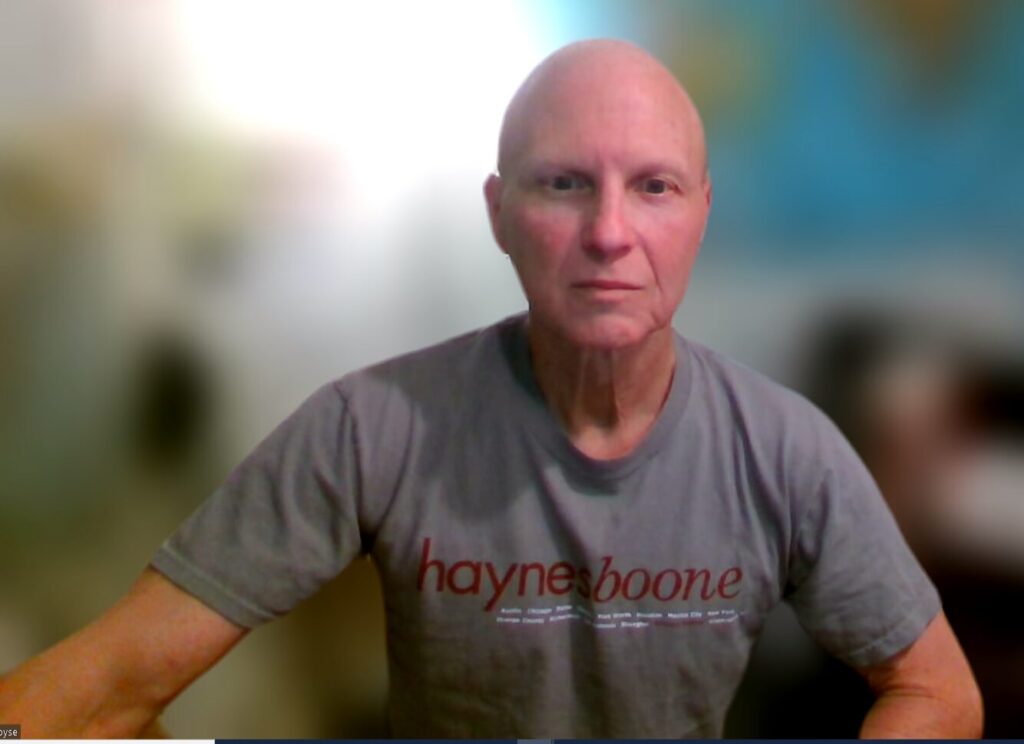
Advanced treatments (neoantigen peptide vaccine, NK cell expansion therapy, dendritic cell expansion therapy)
One of the treatments I’ve taken that is very cutting-edge and forward-looking is a cancer vaccine–a neoantigen peptide vaccine. The vaccine is not like a drug or a checkpoint inhibitor. You’re using your own cells.
I also received NK cell expansion therapy and dendritic cell expansion therapy, as well as some other things. Next month, I’m going in for a second round of a different set of targets, same concept, neoantigen peptides.
It took me a little while to find people that do this legitimately. But I did find these groups–and last year, I got my vaccine.
From the day I was diagnosed, I read NIH papers, PubMed papers, every single day. And I’ve gone down so many rabbit holes, you can’t imagine.
I read about a woman who lives in my neighborhood in Northern California who had stage four pancreatic cancer, and she got this vaccine–and afterwards, she went into a complete and total response, total remission. And I said, okay, I think there’s something there. I found it just through research.
I went to Japan to have mine, the first round anyway, because they are not subject to FDA rules, so they can move more quickly. And with pancreatic cancer, it’s important to move quickly. I didn’t want to wait around, so I went to Japan and got it done quickly.
Importantly, the physician I chose there also has his own lab, and that’s really important. So the administering physician also could get it from his own lab and I didn’t have to worry about any disconnect between those two components.
Now, I’m getting this vaccine in the United States under an expanded access application to the FDA. They also call that compassionate use, and that is an approach. But it’s another big red tape bureaucratic process that we should not make people go through. Furthermore, over here, it’s out of pocket and is very expensive, and I acknowledge that it may be simply beyond the reach of a lot of cancer patients. It costs so much because it’s not FDA approved. I’ve written and testified to the FDA about it. I’ve been beating a drum that we really need.
Now, I will tell people who are considering this vaccine that in Japan, it costs about one fifth of what it costs here. So take that for what it’s worth.
Lifestyle changes
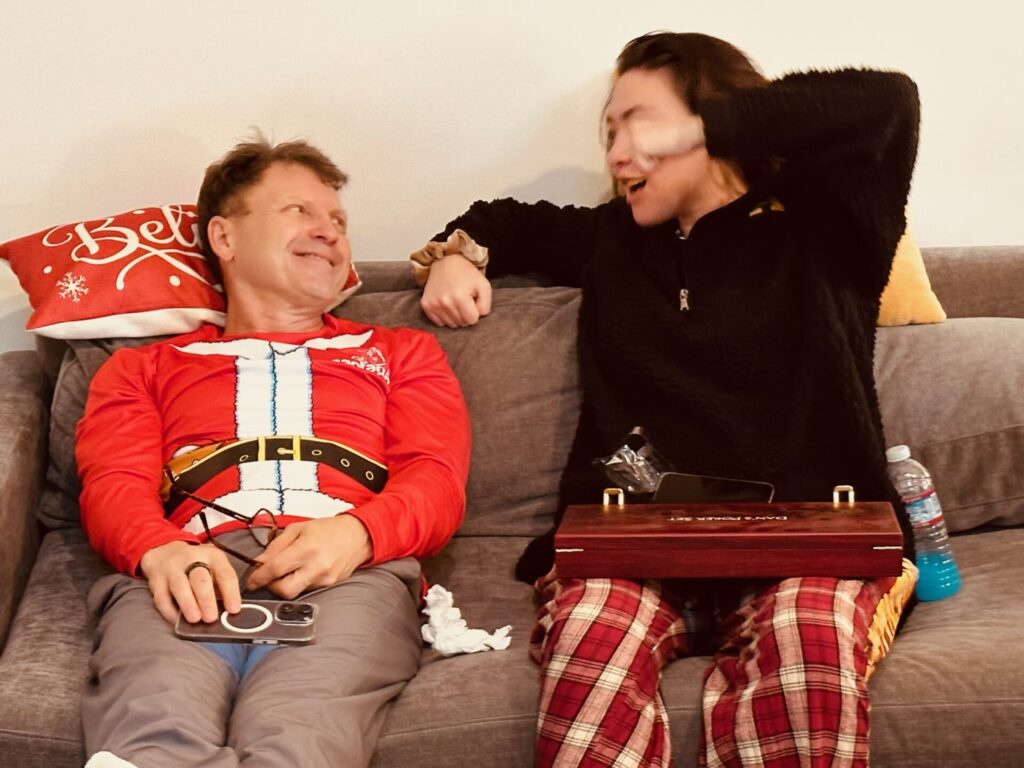
As I sit here today, I am cancer free, at least for now. And you might ask, why is that? Well, I can’t tell you. It might have been the chemo, having had surgery at the exact right time, or metabolic factors. It was no doubt partly lifestyle changes.
I had to say to myself, what could I improve in my life that would make my body as inhospitable as possible to a cancer cell? And I made major, major changes.
Firstly, my diet is much different now than it used to be. It is as anti cancer diet as they come.
I was a vegan for five years before my diagnosis, which I thought was the healthiest diet you could possibly have. What I have since discovered is that it is not.
To get enough calories, given my exercise schedule, I just had to eat too much processed carbs and sugar. In retrospect, I see that I had the exact diet you would have if you were trying to get sick. I was just flooding my body with too little protein, too little fat and too little plant based whole foods and too much processed carbs.
Now that I wear a blood glucose monitor, I can see what they do to your body. And so I had to change. I’m not keto, but I am low carb.
So I keep my protein high so I can keep my muscle lean muscle mass high. And then fats. I’ve kind of shifted from saturated fats to healthier fats, the monounsaturated, polyunsaturated fats. No sugar, no alcohol, no processed carbs, very little red meat. Very little processed meat.
I eat so many vegetables, a lot of fiber, a lot of things good for the microbiome, sprouts for sulforaphane, stuff like that. Citrus, lemons, though not oranges. They’re a little too sugary for me.
I exercise a lot because that is probably the number one thing. Heavy exercise, studies show, reduces the risk of cancer recurrence by 50%.
And then there’s supplements. There’s cortisol. There’s sauna heat therapy. I learned in Japan that it creates heat shock proteins that a normal cell can manage just fine. But a heat shock protein to a cancer cell completely messes it up and maybe makes it visible to your immune system, or maybe just kills it through mechanical stress.
I’ve really gotten into cold therapy, cold water, ice baths.In the wintertime, I’ll go run in the snow with just my running shorts on as long as I can stand it. I think the cold therapy has made my immune system a lot stronger than it was. And it also increased the brown fat in my body. And I’ve got the DEXA scans to back that up, and that has reduced my blood glucose, which means that it’s less likely that these sugar hungry cancer cells are going to get all the nutrition that they want.
… don’t lose hope. Because everything is moving so quickly.
Words of Advice
Firstly, being your own advocate is super important and you just have to be assertive about this. That’s hard for a lot of cancer patients. It’s hard to demand that your doctor do stuff when they’re the expert–what do you know? But you’ve just got to be your own advocate and you have to self educate.
Number two is, if you do standard of care treatment, you’re going to get a standard of care result. And that’s all those bad statistics you’re looking at. Those are all standard of care statistics. You’ve got to be willing to go a little further than that.
And then the third thing is don’t lose hope. Because everything is moving so quickly.
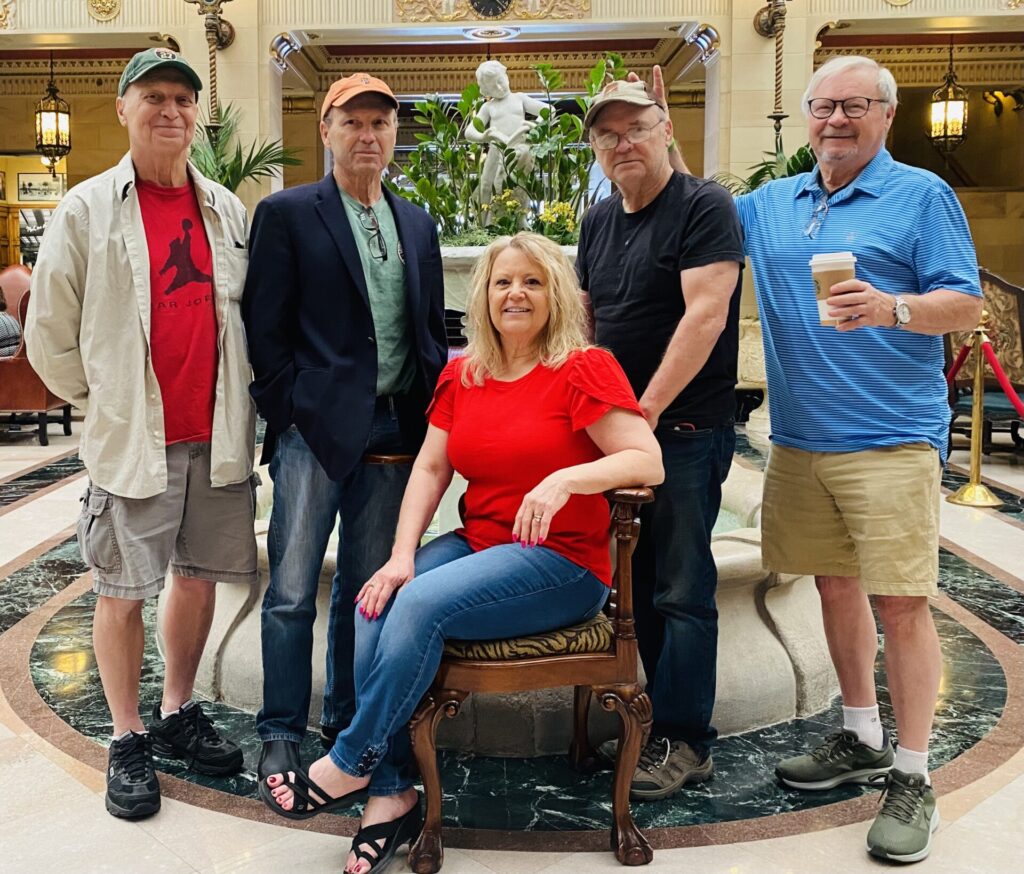
Finally, it’s become obvious to me that our solution to cancer is not going to come from our traditional sources: big pharma, big government, public companies that have shareholders to report to. It’s going to come from the people I work with, startups.
We need companies that are willing to swing for the fences and try something big and bold and novel.
I really believe that the big, disruptive, game-changing cancer cure is going to come from my people, the startup community.

Inspired by Roger's story?
Share your story, too!
12 replies on “Roger’s Stage 2 Pancreatic Cancer Story”
Reading Roger’s story was deeply moving. It’s one thing to hear about pancreatic cancer in general, but hearing it through someone’s lived experience makes it real and human. The way he talks about fear, uncertainty, and the moments of hope reminds us that behind every diagnosis is a person with relationships, dreams, and dignity. His honesty about the emotional side of the journey, not just the physical, is something many people rarely talk about, and that vulnerability deserves respect.
Roger, very inspiring story
I have stage III pancreatic cancer diagnosed in December 2023. I have completed 5 out of 6 cycles of chemo and hoping to have Whipple’s after the 6th cycle.
Please let me know the name of the clinic in Japan where you got the neo-antigen peptide vaccines. How did they get your tumour sample there?
Much appreciated.
Hi Roger
Thank you for sharing your very inspiring journey with this disease. I was recently diagnosed with stage 4 adenocarcinoma in the esophagus which has spread to my liver and left lung. I would greatly appreciate more information on what clinics you visited in Japan and doctor’s names that you used for the three additional treatments you mentioned. I’m also interested in how you are able to get these treatments here in the United States. As you know time is of the essence with this disease and I would greatly appreciate your prompt response. Thanks again.
Hi Roger,
Thank you for posting this inspiring story.
My husband is fighting a stage 2 pancreatic cancer right now. Chemo is only keeping the cancer stable, it has not shrunk as of now. I was wondering if you could please share where you received the neoantigen peptide vaccine, NK cell expansion therapy, dendritic cell expansion therapy. If you could share any info it would be greatly appreciated.
Many thanks,
IJ
Please share the clinic in Japan where you had treatments.
Also, the doctor at Stanford that treated you.
I am helping my friend who has pancreatic cancer get life-saving treatment if it’s not too late.
We live in silicon valley and have access to recommended doctors and treatments.
I feel blessed to find this information and hope to save my friends life with this information. Thankful beyond measure!
Hi Roger
Thank you for your story! I am a pancreatic caner patient as well. Unfortunately, I am stage four. I would love to know about your contact and treatments in Japan. If you can share I would greatly appreciate it.
Hi Roger
A warm Hello from Sunny Athens Greece
I read your story, I am on the same trip since 2020, but at stage 3 and with a whipple surgery plus, and every that passes i read and challenge my doctors. they are great but overwhelmed with patients,
2 questions cause in Europe we have the same limitations sometime due to the European FDA
can you share with me the details where you had
neoantigen peptide vaccine, NK cell expansion therapy, dendritic cell expansion therapy
of the institutions in Japan (prefer the Japan cause USA is too expensive for us as well) .
Thank you if you want to have a chat on whatsap its fine too
Thank you ever so much!
If I was Roger, I would follow up with an Oligoscan testing to determine his mineral/heavy metals.
Can you tell us specifically who you went to for help in Japan and who the preventative organization was that you went to.
Dear Roger,
Thanks for posting your inspiring video. I am a lawyer as well, and one of my friends/clients was just diagnosed with ovarian cancer. I passed your video on to her, and she was hoping to get in touch with the doctor and clinic in Japan that helped you with the neoantigen peptide vaccine. Would you be willing to provide that contact information? I would greatly appreciate it. Thanks for your help and for giving hope to so many people. Best regards, Steve Bodden
Hello Roger, I found your story incredibly inspiring and valuable as you shared your journey in detecting and battling pancreatic cancer. Recently, my best friend was diagnosed with the same type of cancer and is currently undergoing chemotherapy. I’m curious if you could share information on where you obtained the cancer vaccine in Japan. Your prompt response would be highly appreciated. Thank you.